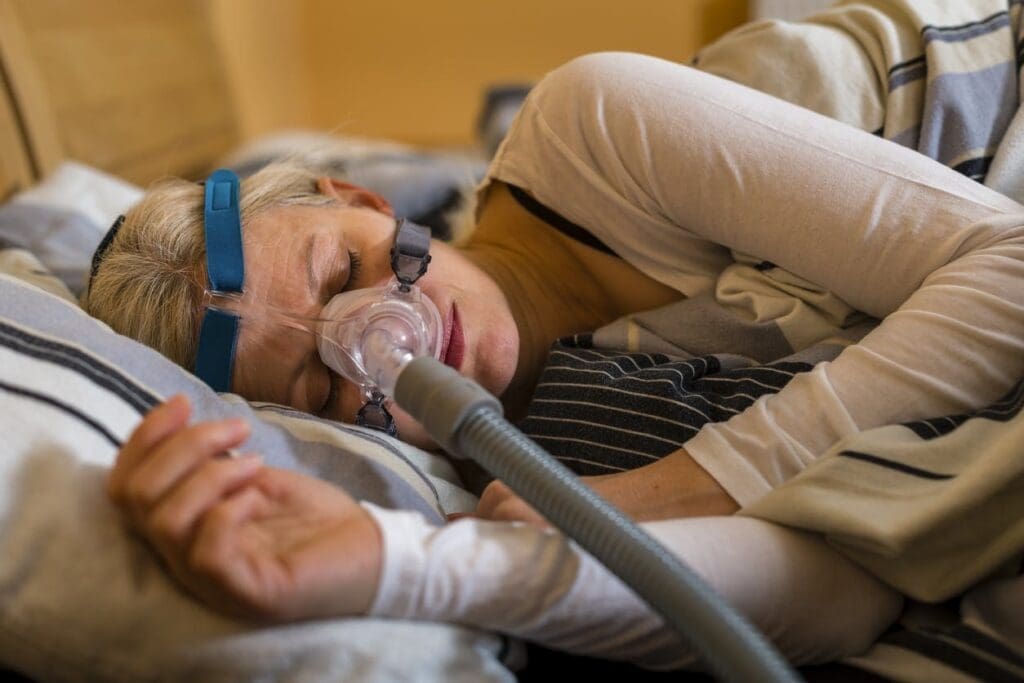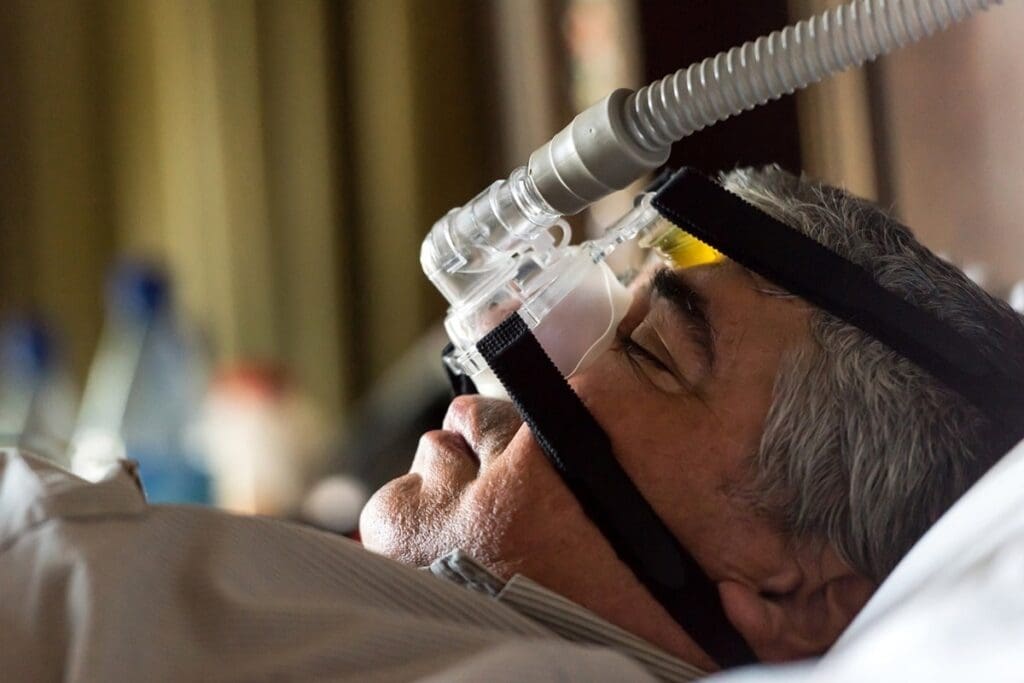Last Updated on November 24, 2025 by

Sleep apnea is a condition where breathing stops or becomes shallow during sleep. It’s not seen as a neurodivergent condition. Yet, there’s a strong connection between sleep apnea and sleepiness, especially among people with ADHD and autism.
Studies show that people with neurodivergent conditions often face sleep issues, including sleep apnea and sleepiness during the day. When breathing interruptions happen at night, oxygen levels drop, leading to fatigue add and sleepiness the next day. This affects focus, mood, and behavior, which are already sensitive areas for neurodivergent individuals.
The link between sleep apnea and sleepiness and neurodevelopmental conditions goes both ways. Sleep troubles can make neurodivergent symptoms worse — such as hyperactivity, poor attention, or emotional regulation — while those same symptoms can make restful sleep harder to achieve.
Recognizing the signs of sleep apnea and sleepiness early can lead to better diagnosis and treatment. With proper sleep studies, behavioral strategies, and medical support, improving sleep can also improve daily functioning for people with neurodivergent conditions.
Understanding the difference between sleep apnea and neurodivergent conditions is important. They share some symptoms, but their causes and treatments are different.
Obstructive Sleep Apnea (OSA) is a sleep disorder. It happens when the airway gets blocked during sleep. This leads to breathing stops and starts, causing sleep problems and tiredness during the day. OSA is not a neurodivergent condition, but it can happen with neurodivergent conditions, making diagnosis harder.
Neurodivergent conditions, like Autism Spectrum Disorder (ASD) and Attention Deficit Disorder (ADD), affect how the brain works. They change how people behave, think, and see the world. People with neurodivergent conditions might find social interactions hard, struggle with planning, and have trouble with sensory information.
Neurotypical refers to people whose brain function and behavior are seen as typical. They are often used as a standard in medical tests. But, there’s a growing understanding of the importance of neurodiversity. Knowing if sleep problems come from a neurodivergent condition or something like OSA is key for the right treatment.
A clinical expert said, “Getting the right diagnosis is essential for helping people with sleep and neurodivergent issues.”
Sleep disorders and neurodevelopmental conditions often go hand in hand. This makes diagnosis and treatment a big challenge. It’s even more complex in cases like autism spectrum disorder (ASD) and attention deficit hyperactivity disorder (ADHD). Sleep problems can make symptoms worse.
Research shows that people with ASD and ADHD face sleep disorders more often than others. For example, many kids with ASD struggle with insomnia and sleep apnea.
Studies reveal that sleep disorders and neurodevelopmental conditions share brain pathways. Problems in sleep-regulating brain areas can also impact attention and behaviour.

Genetics are key in both sleep disorders and neurodevelopmental conditions. Some genetic mutations can lead to sleep issues and neurodevelopmental disorders.
People with neurodevelopmental conditions often have unique sensory processing. For instance, being too sensitive to outside stimuli can make it hard to sleep.
The connection between sleep disorders and neurodevelopmental conditions shows the need for a full treatment plan. Healthcare providers can better manage these complex issues by understanding these links.
Key areas to focus on include:
It’s important to understand how autism and sleep problems are linked. This knowledge helps improve life for those with ASD. Many families with autism face sleep challenges.
Children with autism may struggle with sleep for several reasons. Anxiety, sensory issues, and trouble with bedtime routines are common causes. These problems make it hard for kids to relax and sleep.
Children with autism often have sleep issues like insomnia and night terrors. They might also have restless leg syndrome or trouble keeping a regular sleep schedule.
To help autistic kids sleep better, parents can start a consistent bedtime routine. They should also make the bedroom a sleep-friendly space. Using visual schedules can help signal bedtime.
By knowing why sleep problems happen in ASD and using strategies to fix them, families can improve their sleep and overall health.
Understanding the link between ADD and sleepiness helps manage symptoms. The connection between Attention Deficit Disorder (ADD) and sleep problems is complex. It involves many factors.
People with ADHD often face sleep challenges. These can include trouble setting a regular sleep schedule and relaxing before bed. They might also have other sleep disorders. ADD sleep issues can make ADHD symptoms worse, creating a hard cycle to break.
Does ADHD mean you need more sleep? Research shows that while sleep needs might not be higher, the quality is often lower. This can cause more daytime sleepiness and other problems.
ADHD difficulty waking up in the morning is common. To help, try setting a consistent wake-up time, using light therapy, and starting a morning routine. Knowing how add and sleep interact is key to finding good strategies.
By tackling sleep problems, people with ADHD can see better symptoms and a better quality. It’s a vital part of managing the condition well.
People with neurodivergent conditions, like ADHD, face a higher risk of sleep problems. These issues include breathing troubles while sleeping, with obstructive sleep apnea (OSA) being a big worry.
Research shows ADHD folks are more likely to have OSA. The reasons are not clear, but it might be due to brain differences and body structure.
Sleep apnea can make ADHD symptoms worse. It disrupts sleep, leading to more trouble focusing and being restless.
It’s important to catch sleep problems early. Parents and doctors should watch for signs like snoring or feeling tired during the day. They should think about testing for OSA as part of overall care.
People with Autism Spectrum Disorder (ASD) and Attention Deficit Hyperactivity Disorder (ADHD) often have trouble sleeping. This can really affect their daily life. Finding the right treatment is key to solving these sleep issues.
Those with ASD and ADHD often face breathing problems while sleeping. Continuous Positive Airway Pressure (CPAP) therapy is a common treatment. Sometimes, adenotonsillectomy is also suggested.
Finding the right sleep aid for an autistic child is important. Melatonin is often used to help with sleep. But always talk to a doctor before giving any sleep aid.
Creating a bedtime routine is vital for ADHD sleep issues. This can include reading, telling stories, or relaxing exercises. Also, cutting down on screen time before bed can help you sleep better.
Neurodivergent sleep care is complex and needs a team effort. It requires a detailed plan that meets each patient’s unique needs.
A team of experts, like psychologists and sleep specialists, is key. They work together to create a treatment plan that fits the patient’s sleep and neurodivergent needs.
Using the latest research protocols in treatment plans is important. It keeps care current and is based on the latest research on sleep and neurodivergence.
Patient-centred treatment planning is essential. It means understanding the patient’s preferences and values. It also means educating the patient and their family about their options.
It’s key to understand how sleep disorders and neurodevelopmental conditions are linked. Sleep apnea and other sleep issues often happen with Autism Spectrum Disorder (ASD) and Attention Deficit Disorder (ADD).
Getting better sleep can really help with neurodevelopmental issues. By fixing sleep problems, people with ASD and ADD might see their symptoms lessen. The National Heart, Lung, and Blood Institute (NHLBI) says sleep is vital for reducing these symptoms.
Using a team of specialists is important for good care. This team can help people get the sleep they need. With better sleep, the lives of those with neurodevelopmental conditions can improve a lot.
No, obstructive sleep apnea is not a neurodivergent condition. But there’s a big connection between neurodivergent disorders and sleep issues.
The opposite is neurotypical. It means people who develop and function like most others.
Yes, people with ADHD often have trouble sleeping. They might need more sleep than others, but it varies.
Autistic kids face sleep issues for many reasons. This includes sensory differences, anxiety, and trouble with bedtime routines.
Help them by setting a regular bedtime routine. Make their sleep space good for rest. Weighted blankets can also help.
ASD sleep issues include insomnia, sleep apnea, restless leg syndrome, and trouble sleeping at the same time every night.
Yes, sleep problems can make ADHD symptoms worse. It’s key to tackle sleep issues to manage ADHD well.
The best sleep aid for autistic kids can differ. Options include weighted blankets, melatonin, and white noise machines.
Sleep apnea can make ADHD and ASD symptoms worse. It disrupts sleep and reduces brain oxygen.
Screen for sleep apnea in those with ADHD and ASD. Use sleep questionnaires and polysomnography for this.
Subscribe to our e-newsletter to stay informed about the latest innovations in the world of health and exclusive offers!